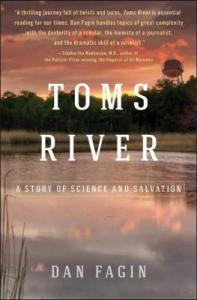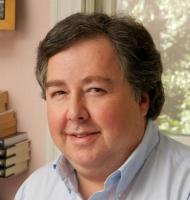Detective story: Fagin's Toms River
Dan Fagin
Bantam (Random House), March 19, 2013
Hardcover: $28, Kindle: $13.99
ISBN-10: 055380653X
Contact info:
- Dan Fagin, (516) 801-2477, dan.fagin@nyu.edu, http://www.twitter.com/@danfagin
- Publicist: Cindy Murray, (212) 782-8292, CMurray@randomhouse.com
- Agent: Jane Dystel, (212) 627-9100, jane@dystel.com
- Author website: www.danfagin.com
Fagin writes:
For me, the most interesting areas of science have always been the murky borderlands where data is insufficient and interpretations are provisional, yet the need for action is acute, because the stakes are so high. The life-and-death detective work of environmental cancer epidemiology checks all of those boxes for me, which is why I wrote so much about it during the 18 years I worked at Newsday.
The astonishing story of Toms River, New Jersey, is something I got interested in 2001, when state and federal health agencies completed their joint investigation of the childhood cancer cluster, just after more than 60 families reached a multimillion-dollar settlement with two large chemical companies and the local water utility.Both were remarkable milestones because the investigation not only concluded that the cluster was probably non-random, it also found that the likely cause was industrial air and water pollution. That’s something that almost never happens in residential cluster investigations, which tend to end inconclusively because the statistical uncertainty is too high. Similarly, it’s extremely unusual for such a large group of families to win a major settlement over cancer claims.
I’ve also always been interested in the use of longform, character-driven narrative to illuminate the complexities of science for lay audiences, so when I left Newsday in 2005, and joined the faculty at New York University, I resolved to look for an opportunity to tell a great story that would introduce readers to the grand sweep of carcinogenesis research. Toms River was the obvious choice.
My proposal attracted the interest of several major publishers, so I began the reporting in 2006, resolving to “go big” by weaving historical vignettes and contemporary research into the Toms River saga.
The reporting took longer than I ever imagined it could, requiring nearly 200 interviews plus extensive historical research and lots of Freedom of Information requests. I read hundreds of studies along the way. In the end, though, it was heartening to see how well everything coalesced into what I hope is a coherent narrative that will tell readers something they didn’t know about science, history, and the best and worst of human behavior.
———————————
Deadline for April 2013 book column: March 28, 2013
To submit your book announcement, follow the above format. Include your name, phone number, and email address, along with contact information for your publicist and agent. Send a photo of yourself and of your book jacket (small jpg files).
Write 250-350 words to summarize your book’s contents. Tell how you developed your idea, researched the book, and wrote it. Include a little about the book’s route to publication. No press releases, please.
Send info to Lynne Lamberg, editor, New Books by NASW Members, llamberg@nasw.org.





